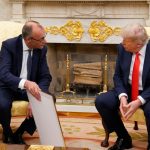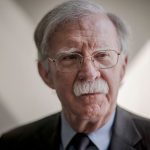Earlier this month, a "true friend of Israel and the Jewish people” is welcomed by Israeli President Isaac Herzog at his official residence in Jerusalem, a somewhat weathered complex known as Beit HaNassi. His guest is Frank-Walter Steinmeier, Herzog’s German counterpart. The two have known each other for decades. Indeed, Steinmeier publicly refers to Herzog by his nickname, "Bougie,” and their wives are on similarly close terms.
The article you are reading originally appeared in German in issue 21/2025 (May 17th, 2025) of DER SPIEGEL.
Large round tables have been prepared for the state dinner, with one of them, intended for the presidents and their wives, standing apart from the others. A small stage with two microphones has been set up in front of it. Appetizers are served as Herzog presents his guest with a medal of honor and showers him with accolades.
"On behalf of the people of Israel – on behalf of the generations who remember and those yet to come – I thank you for your steadfast friendship in our most difficult hours,” Herzog intones. "As you said: The friendship between Germany and Israel is a gift – and it is also a responsibility.”
It was, says one banquet guest, an extremely emotional moment.
Then it is Steinmeier’s turn. Speaking in English, the normally matter-of-fact German president allows his language to become a bit flowery on this evening.
"Every visit to Israel makes my heart beat faster,” says Steinmeier. "The State of Israel has left a deep, deep mark on who I am. As a politician, but even more so as a human being.”
The occasion is the 60th anniversary of the establishment of diplomatic relations between Israel and the Federal Republic of Germany. Herzog visited Steinmeier the day before in Berlin before the two then traveled together to Israel. In truth, however, there is more at stake.
Israeli President Isaac Herzog with German President Frank-Walter Steinmeier on a visit to the National Library in Jerusalem.
Frank-Walter Steinmeier speaks about the German-Israeli relationship since October 7, 2023, the day of the Hamas terrorist attack that prompted Israel to invade Gaza and seek the Islamist group’s destruction. He reminds his audience of the peace that seems so far out of reach. And he closes with the words: "Germany is on your side.”
Then, Ivri Lider, a popular Israeli pop star, sings "Imagine” by John Lennon. "Imagine all the people, living life in peace.”
That same evening, in Beit Hanun, some 70 kilometers southwest of Jerusalem, Yahya Hamad does not know how he is going to feed his family. The situation has never been as grim for them as it is now, he says. Hamad, 50, lives here with his wife and seven children. The day before they ran out of flour, he says in an interview conducted over the phone, and now all they have left are a few packages of rice and noodles and some canned food.
"Our reserves are dwindling, and the prices are so terribly high.”
The aid organizations have nothing more to distribute, he says. A single meal for the family now costs the equivalent of $25, which he cannot afford, even though he had a well-paying job as an IT specialist at Al-Quds University before the war and still receives a portion of his salary.
Gaza Strip resident Yahya Hamad standing in front of the ruins of his home.
A look into the shelter where the Hamad family lives in the northern part of the Gaza Strip, next to the remains of their home.
Since returning to northern Gaza in mid-January during the ceasefire, all nine of them have been living in a four-by-six-meter shelter next to the ruins of their home, which was bombed at the start of the war. There are likely still bodies beneath the rubble of the neighboring house. "The smell of decay is often in the air,” he says, adding that the stench blends in with the sewage and trash piled up at every corner. The vermin are everywhere, he says, with the rats coming out at night. Last night, Hamad says, they attacked a hungry dog. The children are suffering from insect bites, rashes and stomach problems due to contaminated water and undernourishment.
His two youngest daughters often cry from hunger, Hamad says. He tells them they should drink water or go to sleep early. But going to sleep is made difficult by the constant noise of war: gunfire, explosions and the perpetual whirring of drones. A few days ago, he says, an Israeli helicopter struck a nearby target causing his wife and children to cry out in fear. "And I couldn’t protect them.” His youngest daughter Malak, he says, frequently asks when she can return to school.
"We don’t have a future here anymore,” Yahya Hamad says, "the world has betrayed us.”
A "gift” is what Frank-Walter Steinmeier called German-Israeli relations, and he is no-doubt correct, even if the relationship was still rather probationary in 1965. It was hardly to be expected that just 20 years after the liberation of the concentration camps, both a democratic German state and a democratic Jewish state would even exist, let alone establish diplomatic ties.
More than any other country, Israel forces the Germans to question their own identity and to ask themselves who they are and who they want to be. Israel is the land of Holocaust survivors. The people who, if Adolf Hitler and his many German supporters had had their way, should have been exterminated.
The lessons drawn from the Holocaust by Israel and by Germany may be diametrically opposed: the Germans swear to never again be perpetrators, the Israelis to never again be victims. But this changes nothing about the deep connection between the two countries based on their shared experience.
In a 2008 speech before the Knesset, Israel’s parliament, Angela Merkel gave the German half of this relationship a name: the security of Israel, she said, was an element of Germany’s "Staatsräson” (raison d’état). It is a term that implies that the relationship between Israel and Germany is not and cannot be a normal one: To learn from the Holocaust means doing everything possible to guarantee the security of Israel.
Chancellor Angela Merkel seaking in the Knesset in 2008: "Learning from the Holocaust means doing everything possible to guarantee Israel's security."
But what does the crime of the Holocaust really mean for Germany? Does the country primarily have a responsibility toward Israel, toward Jews everywhere? Or does it also have the responsibility to prevent further genocides and misanthropy, regardless of where and of who is committing the crime? Both the concept of "crime against humanity” and that of genocide – the latter developed for the UN by the lawyer Raphael Lemkin with the aim of preventing similar events in the future – both internalize the concept of a universal catastrophe.
This puts Germany in a bind. There are few countries that defend the rule-based order as vigorously as Germany. Yet when it comes to the relationship to Israel, the Germans have stretched this order time and again. National interests are not always straightforward, and they can be contradictory. That, at least, is how it has always been. But the war in Gaza has cast doubt on this German-Israeli agreement. Israel was always an exceptional case. But now, the contradiction may have become too extreme to be ignored any further.
Allegedly to bring Hamas to heel, Israel has blocked the entry of food and aid into Gaza since May 2 and resumed its military offensive with even greater brutality than before. Again and again, the air force has bombed hospitals and schools serving as emergency shelters. Civilians are killed nearly every day. Israel has defended its attacks by claiming that Hamas positions are frequently beneath or next to civilian facilities. Proof of such allegations is hardly ever given.
The death toll kept climbing during Steinmeier’s visit as well. At the same time, there are still hostages being held prisoner in the Hamas tunnels. Many of them may be dead; their families have to live with the uncertainty. The blockade, though, also has consequences. International aid organizations have warned that the risk of famine in Gaza is high and growing. Nearly half a million people are severely at risk. Already, every second child suffers from food insecurity.
Meanwhile, the Israeli government under Prime Minister Benjamin Netanyahu is openly admitting its intention to expel the Palestinian population or compel them to leave, preparatory to a permanent occupation of the territory. Netanyahu has repeatedly said he intends to implement Trump’s plan for a "Riviera of the Middle East.” Shortly before his meeting with the German president, Netanyahu said of the people in Gaza: "If we give them a way out, I’m telling you, more than 50 percent will leave. In my opinion, many more.”
It was nothing short of an expression of support for the mass expulsion of the people of Gaza – on the same day he then met with the German president. Can Germany really continue its support of this man?
Food being distributed to Palestinians in Khan Younis in May.
Steinmeier is fully aware that he must strike a delicate balance. His visit’s itinerary was evidence enough. It included not only the obligatory meetings with the country’s top politicians, but also a visit to a kibbutz, a long stopover in the National Library of Israel, and a trip to the Weizmann Institute, one of the country’s most important research institutes. And he met with Israeli intellectuals to discuss the concerns of Israeli civil society about the state of democracy in Israel and their request that Steinmeier pass these concerns along to Netanyahu.
According to a press release from the German president’s office, Steinmeier expressed the "urgent necessity of highlighting political perspectives on how to end the war.”
Even Donald Trump, in concluding his recent agreement with the Arab countries, did not insist that they take up relations with Israel. Likewise, in negotiating the release of an Israeli-American hostage, he bypassed Netanyahu – Trump, who just a few weeks ago published a bizarre AI-generated video of himself sitting on the beach in Gaza with Netanyahu. The French President Emmanuel Macron has sharply criticized Netanyahu, saying his course of action is "unacceptable” and calling Israel’s blockade "a disgrace.” At times one has the impression that Germany is Israel’s last remaining friend.
The statements made in Israel in mid-May by the new German foreign minister, Johan Wadephul, do nothing to dispel this impression. Wadephul said it was "perfectly clear,” in light of the plans for a new mechanism for aid distribution in Gaza, that Israel could not be accused of breaching international law. Yet this is anything but clear. Aid organizations have characterized this U.S.-devised solution as insufficient, saying it would not meet their benchmarks for humanitarian aid. They see it primarily as a tool to displace the population while fending off criticism.
After the massacre of October 7, in which Hamas and its allies slaughtered roughly 1,200 people and took more than 250 hostages back to Gaza, Israel initially received widespread sympathy from much of the global community. During that attack, Israelis were forced to listen helplessly through the media to the cries for help from civilians trapped in their safe rooms near the border. Next to the Arab assault at the start of the Yom Kippur War in 1973, it was the greatest shock in Israel’s history – and the deadliest day for Jews since the end of World War II. Their safety, which formed the basic principle of the Zionist project, was suddenly in doubt. And when images circulated of some Palestinians celebrating the attack, many Israelis became convinced that "there are no innocents in Gaza.”
Israel hit back hard, bombarding Gaza and later sending in ground troops. It would have been appropriate for Israel’s allies to at least ask Netanyahu for a clear plan of action. But then U.S. President Joe Biden failed in his attempts to temper the Israeli response. And it took a long time before appeals to moderation were heard from Germany. Berlin never seriously considered a general halt to arms shipments.
A worker standing in front of containers containing the bodies of Israelis killed in the October 7 terrorist attack.
As a result, the war became a retaliatory campaign with no obvious blueprint. It remains unclear to this day who or what should succeed Hamas as the authority in Gaza. Netanyahu has spoken of revenge and a "total victory” – a vague goal which allows him to extend the war indefinitely. This primarily benefits his right-wing extremist allies, who want to establish new Jewish settlements in Gaza. The prime minister, who is standing trial on corruption charges, is dependent on these coalition partners. Moreover, he is determined to prevent an official investigation into October 7.
Two legal proceedings, both before international courts in The Haag, are currently underway against Israel or its leaders. The case before the International Court of Justice was initiated by South Africa, which accused Israel of perpetrating genocide in the Gaza Strip. The case is still being heard, and a decision is not expected for several years. In the course of the proceedings, however, the court has already granted three urgent requests, all of which boil down to the demand that Israel protect the civilian population of Gaza and allow humanitarian aid to reach them. The emergency rulings do not prejudice the outcome of the case, but they make clear that the judges do not take the accusation of genocide lightly. To find Israel guilty under the Genocide Convention, the court would have to be convinced of the presence of "genocidal intent.”
Then there are the investigative proceedings at the International Criminal Court (ICC), which concern both Israel as well as Hamas. In November 2024 the ICC issued arrest warrants for Prime Minister Netanyahu and then Defense Minister Yoav Gallant. A warrant was also issued for a leader of Hamas who has since been confirmed dead. Arrest warrants were requested for two other Hamas leaders but not issued because the men had already been killed.
Israeli Prime Minister Benjamin Netanyahu and Israeli Defense Minister Yoav Gallant in 2024.
The chief prosecutor accuses Netanyahu and Gallant of war crimes and crimes against humanity. He lays special emphasis on the claim that Israel has allowed too little food, water, medicine, fuel and electricity into Gaza and thus threatened the survival of its civilian population. Starvation as a method of warfare – it is a grave accusation, but one that may be easier to prove than individual war crimes that involve attacks on civilians.
Germany’s previous government under Chancellor Olaf Scholz struggled to find a response to these cases, especially Annalena Baerbock, Scholz’s foreign minister, who frequently invoked international law. For a long time, politicians evaded the question of what they would do if Netanyahu visited Germany. Because Germany is party to the Statute of the ICC, the authorities would be obligated to arrest him at the court’s request. Yet the idea of an Israeli prime minister being arrested – in Germany of all places – was unpalatable.
During his election campaign, Germany’s new chancellor, Friedrich Merz, publicly voiced confidence in the proportionality of Israel’s military campaign. He announced plans to again boost arms deliveries and stated one day after winning the election that he would invite Netanyahu to Germany – only to backtrack the day he was sworn into office. "We are deeply concerned about Israel,” he told German public broadcaster ARD. It must be "made clear that the Israeli government is obliged to fulfill its obligations in international law, in the law of war, and humanitarian aid must be provided to the Gaza Strip.”
But what if Israel ignores these requests? The problems can no longer be solved by mere rhetoric. Their causes lie deeper – they go back to the Holocaust and the question of what lessons to draw from it. The German-Jewish intellectual Meron Mendel writes in his book "Talking About Israel” (Über Israel Reden) that instead of seriously reflecting on its relationship to the Jewish state, Germany has mostly remained in conversation with itself. It is a nation of 80 million experts on the Middle East, he says, who hold strong opinions despite having little familiarity with the realities on the ground.
When DER SPIEGEL reached Mendel earlier this month, he was on a train to Berlin to meet Steinmeier, whom he would accompany as part of the delegation to Israel. Mendel is director of the Anne Frank Educational Center in Frankfurt am Main, a cultural institution dedicated to the fight against anti-Semitism and racism. Mendel has become Germany’s go-to expert on anti-Semitism.
Raised on a kibbutz in Israel, he moved to Germany after his service in the military. Already then, 20 years ago, he was struck by the importance of Israel to the German national psyche. A key experience for him was witnessing two opposing demonstrations in downtown Frankfurt, separated by a police barricade – one pro-Israel, one pro-Palestine, screaming at each other across the barricade. It reminded him of a football match.
Mendel argues that the relationship to Israel allows Germans to construct "an alleged consensus.” It helps to define a collective identity. As the world becomes more confusing and Germany more diverse, Mendel says, the relationship to Israel gives people orientation – albeit in often conflicting directions. Some believe the German past dictates unconditional solidarity with the Jewish state; others believe that Israelis are the new Nazis. "But a great deal of that is just projection,” says Mendel.
Historian Meron Mendel and the political scientist Saba-Nur Cheema.
He points to the example of Frank-Walter Steinmeier’s opening speech at the 2022 Documenta, which faced allegations of anti-Semitism and anti-Israeli art. Great to have you here, Steinmeier said, addressing the Indonesian art collective that curated the art festival, adding that he is in favor of artistic provocation. But one thing must be made clear, he intoned: "For us, the recognition of Israel is the basis and precondition of debate!”
Shortly thereafter the debate exploded anyway, when anti-Semitic symbols were discovered in several of the artworks exhibited by the collective. Mendel was called to Kassel to resolve the scandal, but he gave up the job after reaching the conclusion that there was little interest in nuanced discussion.
The mechanism described by Mendel shows up frequently in the German debate over Israel. It is a complicated dispute because of the difficulty of extricating the issue from anti-Semitism. The question often arises of what can be said when criticizing Israeli politics without crossing the line into anti-Semitism.
Indeed, it is a boundary that frequently gets crossed. And when it comes to the various definitions of anti-Semitism, or the distinction between political anger and anti-Jewish hatred, the debate in Germany is more vehement than anywhere else.
The Russian-American author Masha Gessen was set to receive the Hannah Arendt Prize in Bremen. But because Gessen – who comes from a Jewish family – wrote an article comparing the situation in Gaza to that of Jews in the ghettos of Nazi-occupied Eastern Europe, the original award ceremony in City Hall was cancelled in favor of a smaller venue. The philosopher Nancy Fraser, who was invited to give lectures at the University of Cologne, had her invitation revoked because he signed an open letter that relativized Hamas’ terrorism and called for an academic and cultural boycott of Israel.
At German universities, particularly in Berlin, students have repeatedly staged occupations, in the wake of which the lecture halls often look like battlegrounds. The protests have resulted in significant repair costs. The official response has been inconsistent.
A lecture hall in Berlin's Humboldt Universitiy following its occupation by pro-Palestinian activists.
The debate is now firmly embedded in the German public sphere. Articles circulate, views are exchanged. The problem is that the debate has not really translated into the political sphere.
This is partly the result of the anti-Semitism resolutions passed by the Bundestag. They were well-intended expressions by the German parliament against anti-Jewish hatred. The resolutions are not legally binding, but their effect is very real: Aside from raising awareness for how anti-Semitism manifests, they have led the so-calledStaatsräson –which originally applied only to foreign affairs – seeping into the domestic arena. Many feel that their ability to criticize Israeli politics has been unduly restricted.
The effect of theStaatsräsoncould be observed in March at the 80th anniversary of the liberation of the concentration camp at Buchenwald. The German-Israeli philosopher Omri Boehm, who was invited to speak at the event, was ultimately prevented from doing so. Boehm had planned to underline the universal lessons of the murder of the Jews. He believes that Israeli particularism, with its assumption that the fate of the Jews is unique and cannot be applied to other peoples and events, leads only to war and exclusion. Thus, he believes that Israel has no future as a Jewish state. Peace and justice cannot be guaranteed by the two-state solution, as is commonly professed in German politics (even if hardly anyone believes it anymore), he argues. A one-state solution is the only way.
But at the center of Boehm’s intended speech was a larger question: How can the remembrance of the past attain new meaning? How does particularism, or the emphasis on Jewish tradition and identity, relate to universalism, or the values that apply to everyone? And what is the meaning of this for today’s world, for Israel and for Germany? Questions that go to the very heart of the German-Israeli encounter.
Boehm was uninvited, primarily due to the pressure that was put on the memorial site by Israeli ambassador Ron Prosor, who called Boehm’s invitation "ludicrous.” He considers Boehm, who lost relatives in the Holocaust, an "anti-Semitic Jew” – a smear that the top representatives of the Netanyahu government in Germany have repeatedly used against critics of the Israeli campaign in Gaza. It is a tool for discrediting both opinions and individuals.
Hardly any politicians stood up for Boehm. What Boehm wanted to talk about was swept under the rug. Instead, the question became whether he was allowed to say anything at all. TheStaatsräsonprevailed. The substantive debate was brushed aside.
Philosopher Omri Boehm in Vienna: How can the remembrance of the past attain new meaning?
It was Angela Merkel who introducedStaatsräsonas an expression of the German bond with Israel. She cared deeply about the country and visited Israel a total of eight times as chancellor. Originally,raison d’étatwas a concept from political philosophy, developed by Niccolò Machiavelli to describe the ruler’s art of preserving power. Merkel’s point was to underline the link between Israel and Germany and its historical foundations. Yet in choosing this word – whether she intended to or not – Merkel touched on something with deep roots in postwar German history.
A great deal had to happen before diplomatic relations between Israel and the Federal Republic of Germany could be established in 1965. With the Luxembourg Agreement of 1952, also referred to as the Reparations Agreement, West Germany agreed to pay 3.5 billion deutsche marks: 3 billion to Israel, 450 million to Jews living outside Israel, and 50 million to others who did not belong to a Jewish religious community.
Chancellor Konrad Adenauer justified the agreement on moral grounds, even if it was clear to him that it could not make amends for "the full magnitude of damage inflicted on life and property.” But that was only one half of his reasoning. The Chancellor was also concerned with the restoration of German sovereignty. This required the Federal Republic, the successor state of the German Reich, to demonstrate that it had changed. Guilt and self-interest were intertwined from the start.
In Israel, the payments were hotly debated. Was it okay to accept this blood money? But it was clear to David Ben-Gurion, Israel’s founding father, that his country needed the money to survive – as well as weapons, which were also supplied by Germany. In 1957, an Israeli delegation presented then Defense Minister Franz Josef Strauß with a long list of requests. The Israelis wanted planes, anti-tank missiles, helicopters, and artillery. With the chancellor’s blessing, Strauß secretly began fulfilling these requests by allowing weapons – and even a helicopter – to disappear from German stockpiles. Submarines were built in Great Britain following German designs, all in secret. And this was long before the Americans started shipping arms to Israel.
In West Germany, too, the relationship to Israel was contested. West German foreign policy at that time followed the Hallstein Doctrine: Whoever wanted diplomatic ties with the West Germany had to cut ties with the GDR, their East German rival. The military cooperation with Israel precluded diplomatic relations with the Arab states, who were successfully courted by the GDR. The West German Foreign Ministry fought to keep Israel at a distance. But Adenauer had his way: Weapons from Germany helped Israel assert itself, while in return Israel provided supplies to the Bundeswehr. This would be the lasting arrangement. No one used the termStaatsräsonat the time, but this is where the concept got its start.
What is often overlooked – and which is reflected in public opinion polls to this day – is the fact that the friendship with Israel is more firmly anchored in western Germany than in eastern Germany. The GDR was strictly anti-Zionist. When the Yom Kippur War broke out in 1973, the East German People’s Army even sent an air force squadron to Aleppo to support the Syrian dictator Hafis Al-Assad. The pilots were ultimately never called into action because the war ended so quickly. But the 12 MiG-21 jets remained in Syria, the arch enemy of Israel, where they formed the core of a new air force.
And then there was the radical left in West Germany. Originally friendly toward Israel, they pivoted after the Six-Day War in 1967. From that point on, many leftists began to see Israel as a mere outpost of American power, a view supported by the fact that the militarily inferior Arab states were backed by the Soviet Union. The student movement and the New Left that emerged from it were mainly aligned with the Palestinian cause. The Green Party politician Joschka Fischer later said that the Six-Day War was one of the key events that steered him toward a life in politics.
It was the horror of Entebbe in 1976 that made him reconsider his position. That year, an Air France flight heading from Athens to Paris was hijacked by a German-Palestinian commando. One of the German hijackers was even a passing acquaintance of Fischer’s. After re-routing the plane and landing in Entebbe, Uganda, the terrorists let all the passengers free – except for the roughly 100 Jews on board. On the basis of their passports and last names, the Germans helped identify them. That Jews could once again be "selected” in this way "horrified” Fischer and steered him off the anti-Zionist path. (Eds. Note: The German word "selektieren” is closely linked to the Auschwitz practice of dividing newly arrived trainloads of Jews into those destined for the labor camps and those sent to the gas chambers.)But not everyone had the same reaction.
The end of the plane hijacking in Entebbe carried out by leftist terrorists from Germany.
In the militant left of those years, there was a deeply rooted hostility towards Jews. The leftist terrorist group "Tupamaros West Berlin” tried to blow up a Jewish community center in 1969, though a technical defect prevented the bomb from detonating. Already then, Dieter Kunzelmann, one of the best-known activists in the scene, spoke disparagingly of the Germans’ "Jewish hang-up.” Leftist terrorists also received military training at Palestinian camps in Lebanon in the 1970s, as did the right-wing extremist group "Wehrsportgruppe Hoffman.”
In these circles, Israel was considered the tip of the spear of American imperialism. This was still evident in the debate surrounding the First Gulf War in 1991, which leftists tended to frame along the same lines – despite fears that the Iraqi dictator Saddam Hussein could attack Israel with poison gas, many refused to support them. Poison gas that Saddam possessed solely due to the help of German specialists. Israel, in other words, was under threat from German gas – quite a scandal.
The intelligence services work together closely. Weapons are bought and sold. Even though there is no official acknowledgement of it, military experts believe that Israel’s nuclear second-strike capability is guaranteed by submarines built in Germany. And when the going gets rough, the German government is there to cover Israel’s back in the diplomatic arena.
All in all, Germany’s policy towards Israel has remained fairly stable over the past decades. During official visits, German representatives will criticize the construction of Israeli settlements. Sometimes these words have an effect, other times they do not. The Germans like to think of themselves as an "honest broker” in the Middle East, as they also nurture relationships in the Arab world. Israel has been critical of such ties, but the relationships have proven helpful to more than one German mediation mission. For example, it was partly due to German diplomacy that the soldier Gilad Shalit, taken hostage by Hamas in 2006, was freed from captivity five years later.
In the wake of the terrorist attack of October 7, Olaf Scholz was one of the first heads of government to travel to Israel. He positioned himself in the European Union against the French, who are considerably more critical of Israel than Germany. And he promised Israel further arms deliveries.
Former German Chancellor Olaf Scholz on a visit to Tel Aviv to demonstrate Germany's solidarity with Israel.
The public opinion of Germany in Arab countries has plummeted. Their impression, according to Sven Schwersensky, who manages the Jordanian office of the Friedrich Ebert Foundation, is that Germany "continually ships weapons to Israel and comes to their defense before the International Court of Justice, while at the same time suppressing criticism domestically.” An employee of another foundation, who prefers to remain anonymous, has observed such developments worldwide: "The blow to Germany’s image caused by their unconditional allegiance is not limited to the Middle East. It can also be felt, for example, in the Balkans or in East Asia. The damage is global.”
Germany is entangled in Israel’s war and can only hope that the Israeli government will restrain itself. But there is little evidence to indicate that it will.
In January, international mediators pushed through an extended ceasefire, during which 33 Israeli hostages were exchanged for 1,000 Palestinian prisoners. The first phase was supposed to be followed by a second, which in turn would lead to an end to the war. But Israel chose to abandon this scheme, demanding instead that Hamas extend the first phase and release the remaining hostages. The Netanyahu government blocked the entry of food and all other aid and promptly resumed its attacks on Gaza.
Since then, it has become less and less possible to get aid to the people in Gaza. Recently most soup kitchens were forced to shut down, their reserves having been depleted. Even Israeli officers anonymously told theNew York Timesthat Gaza faces "widespread starvation.”
Around 70 percent of the Gaza Strip has been declared no-go zones. For over 19 months, the Israeli Army has obstructed the free access of international journalists into the territory.
Drone footage of extreme destruction in different parts of the Gaza Strip.
Earlier this month, the Israeli security cabinet adopted a plan to again expand the war effort. The official reason is to pressure Hamas into freeing the hostages, but the operation’s core objective is to round up over 2 million Palestinians in the southernmost portion of Gaza in order to facilitate their "voluntary departure.”
It is unclear if the army has enough reservists at its disposal to carry out this expansion. There are reports in the Israeli media that half the soldiers called up for duty have not reported to their units. In April, former and current members of the Israeli air force wrote an open letter in which they demanded the immediate "return of all hostages.” The letter lamented the fact that the resumption of the war in March had led to the death of hostages, Israeli soldiers, "and innocent civilians” as well as to the exhaustion of reservists. Since then, roughly 150,000 Israelis from different sectors of the military have signed this appeal or a similar one.
The Netanyahu government has been pursuing its radical agenda beyond Gaza as well. The construction of settlements in the West Bank has exploded since October 7. A few weeks ago, the cabinet succeeded in pushing another piece of the so-called judicial reform through the Knesset, thus further eroding the division of powers. At the same time, they tried to remove both the head of domestic intelligence and the attorney general, taking aim at the final watchdogs of democracy. Israel is on the road to autocracy.
Meron Mendel is having an early breakfast at a Berlin hotel on a recent Thursday morning. He looks tired. The previous evening, he returned from Israel with President Steinmeier, the end of a two-day loop from Germany to Israel to Germany – geographically, politically, and emotionally.
He says it is too simple to blame the difficulties in the German-Israeli friendship solely on the war in Gaza. Still, there must be an honest discussion about what is happening in Gaza. He describes the reception that the Israeli president was given at Bellevue Palace in Berlin and the one Herzog gave the Germans in Jerusalem. Critical remarks were made, he said, but the speech in Jerusalem did not contain a word about the humanitarian situation in Gaza.
Mendel gets the impression that German politicians are stuck in the routines of the Merkel era – a well-ordered world from a German point of view, but a world that has long since ceased to exist. "When Angela Merkel spoke to the Knesset about the GermanStaatsräson, Ehud Olmert was prime minister. There was the threat from Iran, but also negotiations with the Palestinians, a prospect of peace. That was the context in which this term came into being.”
When German politicians look at Israel, says Mendel, they still see a liberal democracy. This has been the basis of the countries’ friendship. But in reality, he says, the situation today is very different. Netanyahu is in the process of turning Israel into another Hungary. He is restricting the independence of the judiciary, obstructing the work of NGOs – the full Victor Orbán program. And it might not take very long. "We’re not talking about the next 30 years. More like the next three.”
Germany is also changing. Earlier this month, Margot Friedländer passed away. But it’s not only the Jewish survivors who are disappearing – so are the German perpetrators. The 1968 generation and the boomers are the grandparents of today. Germany has become a country shaped by immigration; it is more diverse today than at any point its history. All the efforts to tie Germany’s identity to Israel’s cannot change the fact that millions of Germans who came from the Middle East have brought their own histories along with them – as have immigrants from the former Eastern Bloc, many of them Jews.
Israeli society has long been shaped by Misrahi Jews – those of Middle Eastern or North African origin – who often relate differently to Arabs than do Israelis of European descent.
For these reasons, too, one could expect a rift in German-Israeli relations. Especially if the gruesome images keep flowing out of Gaza. The German-Israeli friendship has persisted for the past 60 years on the basis of a deeply felt sentiment: "Never again.”
But this will not be enough for it to persist in the future. The frequently invokedStaatsräsonseemed to dictate an automatic political response. But times have changed. One can no longer claim credibly that there are no alternatives. Choices will need to be weighed more carefully.
Translated from the German by Charlie Zaharoff








